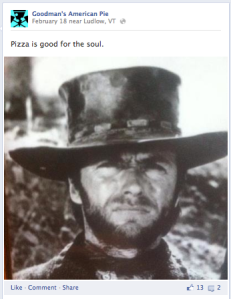Marketers spend much time and energy figuring out how best to create brand loyalty for their clients. Brand loyalty can be described as the extent to which consumers are faithful to a brand (repeat purchases), regardless of marketing pressure by competing brands (Business Directory).
An effective way to create brand loyalty among todays consumer is to create a narrative your target audience can relate to. “Storytelling—in its many forms—is one of the most powerful tools for presenting the truths of your product, service, or brand” (MarketingProfs). A storytelling approach can “help brands more empathically interconnect with the buying minds of their customers. There is simply more for them to hold onto” (MarketingProfs).
Lets look at this narrative Papa John’s put together in 2011.
“Stories are slices of life that can subtly reflect bits and pieces of common ground between consumer and brand” (MarketingProfs). In what ways does “Papa John Telling the Papa John’s Story” execute this well?
Nostalgia. John Schnatte, CEO begins his monologue by reminiscing about when he was young. “When I was growing up as a boy, my mentor was my papa.” The audience relates, thinking about their own experience growing up.
Family values. Speaking warmly of his grandfather, he says that since the beginning, Papa John’s has never forgot what mattered most. “He had a fanaticism of doing things in a high-class manner…One of our fundamental beliefs from the get-go was we were gonna be a family run, independent pizzeria–no matter how big we got.” Even though Papa John’s is a franchise with over 4,000 stores nationwide, Schnatte asks that you still think of the company as a mom-and-pop shop.
Just like you. When I was fifteen I was wershing [washing] dishes…and I hated washing dishes and the…brothers gave me a raise, and I got to make pizzas. I worked as a dishwasher for close to five years. I hated washing dishes. I got a raise. Now I’m starting to relate to this guy! Throughout the video, we see scenes of this millionaire working side by side on the assembly line with his “teammates”, laughing and getting his hands dirty, “saucin” and “slappin the dough”. This can make an audience think he’s in the kitchen making pizza. He’s not.
Care about employees. “The thing I am most proud of today is our 80,000 team members worldwide, they don’t do anything second rate…[they] put their best foot forward…We founded Papa John’s with two simple premises: take care of your people, and make the best pizza you can.” Papa John’s isn’t like other companies that treat their employees badly. Schnatte cares about his workers and values them so much he calls them his teammates.
Do you think Schnatte really feels this way about his teammates, after comments he made suggesting Papa John’s would cut employees’ hours and raise prices in anticipation of the Affordable Healthcare mandate?

Are you loyal to any brands because of a story you were told? Research the WHO behind the marketing in order to distinguish between what the company wants you to see and what’s actually there.
W/P Option 2: 04/19




